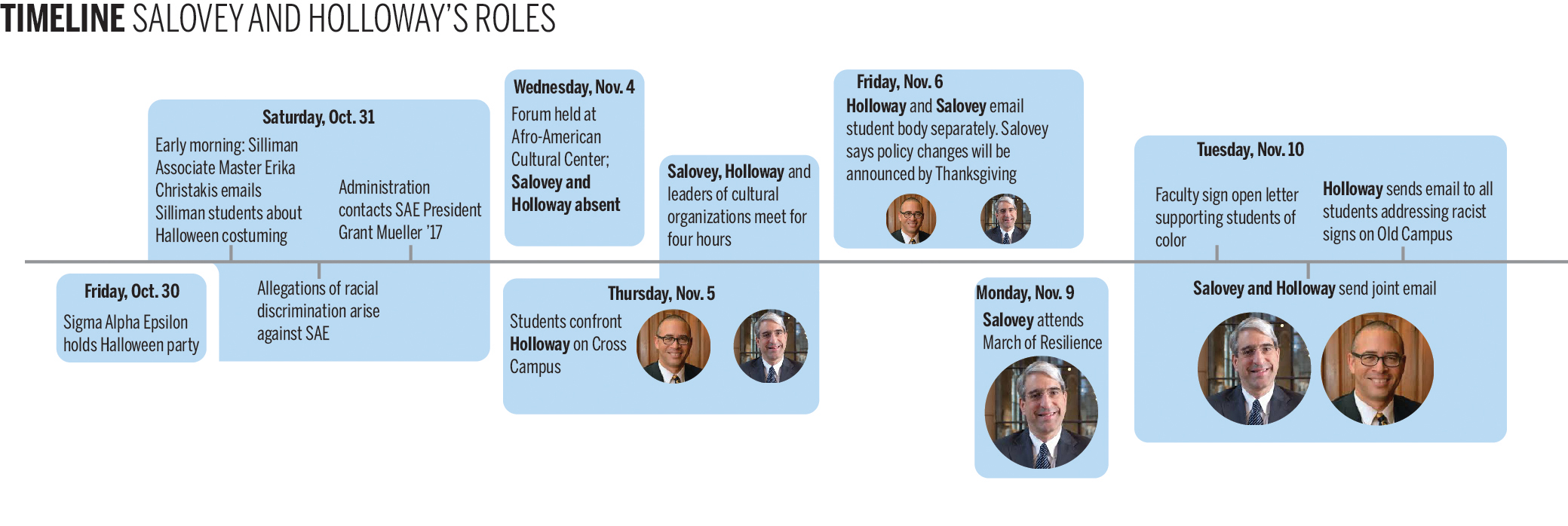
The day after more than 1,000 students marched in a show of solidarity for minority students, University President Peter Salovey and Yale College Dean Jonathan Holloway released a statement on acceptable forms of protest as well as the importance of diversity and freedom of speech on campus. The same day, more than 200 faculty members signed an open letter in support of minority students.
In a Tuesday email to the Yale community, Salovey and Holloway wrote about the importance of two University principles: respect for diversity and as freedom of speech and expression. Their joint email comes after more than a week of student protests, forums and closed-door discussions between students and administrators. While Salovey and Holloway each sent individual emails late last week affirming the need for the University to do better in light of racial controversies on campus, their joint Tuesday email sent a clearer message: While all students have the right to protest and counter-protest, they do not have the right to engage in “threats, coercion and overtly disrespectful acts.” Salovey told the News that student protests cannot infringe on a speaker’s right to be heard.
“Protests where people prevent others from hearing or interacting with the speaker are inconsistent with Yale’s policies,” Salovey said. “On the other hand, protests can be visible or loud — they just can’t drown out a speaker or prevent a speaker from speaking. A good example of an acceptable protest would be if people gathered outside an event and chanted as long as the speaker could continue. A protest that would be not acceptable would be disrupting that speaker.”
Though the email was sent near the start of a Yale Political Union debate on affirmative action that was expected to attract demonstrations from minority student groups, Salovey said the email was not specifically targeted toward that event.
In the joint email, titled “Affirming our community’s values,” Salovey and Holloway reiterated that related policy changes would be announced by Thanksgiving. Salovey told the News late last week that policies under consideration include new mental health services specifically for minority communities and a “more obvious mechanism” for students to report situations in which they felt discriminated against.
Salovey and Holloway also wrote that they are working to renew the University’s commitment to the freedom to speak and be heard “not as a special exception for unpopular or controversial ideas, but for them especially.” They wrote that preventing anyone from raising controversial ideas would rob the Yale community of the right to engage with those ideas in a way that gets to the core of Yale’s educational mission.
The email also responded to national media coverage of recent campus events and controversies.
“The news and social media have reported threats, coercion and overtly disrespectful acts, and these actions have added to the distress in our community. They are unacceptable,” the email said.
Offering strong support for the Woodward Report — a set of ethical and social principles put together by a University committee in the 1970s in the face of “explosive debates about race and war” — Holloway and Salovey said they support its major tenet: while exercising free speech can supersede civility, it is always important to keep the latter in mind.
Sam Chauncey ’57 — who served as special assistant to former University President Kingman Brewster and served as university secretary for two decades — said Brewster formed a committee to study the question of free speech at Yale and produced the Woodward Report in response to students protesting a number of University speakers.
“The report is a result of a number of years where controversial speakers came to campus and were allowed or not allowed to speak, and Brewster wanted a game plan that could be followed in the future,” Chauncey said. “The committee concluded that in the end if you have to make a judgment, you come down on the side of free speech, but you really ought to think about the civility issue before you go out and say what you’re going to say.”
The Tuesday email also reaffirmed the University’s commitment to increase, respect and support diversity, citing the recently announced $50 million University-wide faculty diversity initiative. Salovey and Holloway wrote that there is work to be done, particularly regarding faculty diversity, though they also praised the “vibrant communities” at Yale’s four cultural centers and the University’s support for students of diverse sexual orientation, gender, religion and nationality.
“We are committed to supporting all of these communities not only by attending to their safety and well-being but in the expectation that they will be treated with respect,” the email said.
Holloway told the News that the email was meant to address the concerns not only of students over the past week, but also those of faculty members, some of whom are particularly concerned about free speech and student decorum in light of recent protests and confrontations.
“We owe it to everyone to give an update on what is happening,” he said.
Earlier on Tuesday, five members of the Faculty of Arts and Sciences Senate — Emily Greenwood, Matthew Jacobson, Douglas Rogers, Kathryn Lofton and Vesla Weaver — published an open letter of support for Yale students of color. The letter began circulating among all Yale faculty at 2 p.m. and had received more than 220 faculty signatures as of 10 p.m. Tuesday night.
“Calls for greater diversity do not by themselves resolve the experience of racism and devaluation, and maintaining silence about racial inequality on campus only exacerbates the problem,” the letter read. “It is not for students alone to shoulder the many burdens of this work.”
C. Vann Woodward, an American historian at Yale, chaired the committee that produced the Woodward Report.







